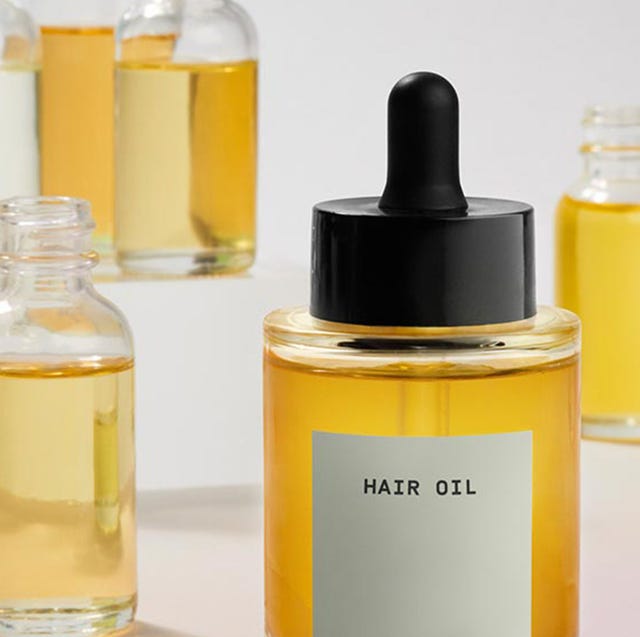What's Hair Oil For? And, Why Add More Oil?
Even for those with greasy hair, plant and nut oils promise to help with styling, restoring moisture, and finding relief from scalp irritation.

Everyone stresses out over having greasy hair. Grease, oil, grime, it's all caused by built-up sebum, aka the scientific term for your hair's natural secretion. Technically, it's oil excreted from the glands bearing each of your hair's roots, and the oil slowly coats each strand with every passing second. (Cue: National Geographic-style close-up of oil under a microscope.) The natural oil levels in your locks can fluctuate, because of hormonal imbalances or what season it is. But, what products you use can raise oil levels; so can both how and how often you shower. That excess oil can cause dandruff, too, as the yeast strain that kickstarts flakes, Malassezia, thrives in oily scalps.
On the opposite end, dryness causes flakes, too. Whether you've shampooed too much or recently went swimming in a pool (thanks, chlorine), the flurries can be stopped by rehydrating your hair and scalp. And how do you do that? Enter oil. I know. It's confusing. Oil causes flakes, but can also stop them.
There's a long list of oils — some with added ingredients (like antioxidants), others with concentrated recipes — that offer varying benefits for the areas above your shoulders. A few drops help tame frizzy hair, moisturize both the hair and scalp, and add sheen and texture. The additional weight it affords can aid in styling, too, as it pins the hair down sans serious force (how gels, pastes, or pomades do it). Plus, for those with long hair, hair oils can actually help distribute oil to the hair's ends, where sebum may not naturally reach.
Ready to give one a try? Seek out an iteration with ingredients like moringa, argan or jojoba oils (for moisture), coconut oil (for shine), bis-aminopropyl diglycol dimaleate (for strengthening), tea tree or peppermint oil (for soothing irritation), or rosemary and caffeine (for slowing hair loss).
Applying it is as easy as dropping some — usually with a dropper embedded within the bottle's cap — into both hands, activating it (aka rubbing it into your hands), and evenly distributing it throughout. There are typically strict instructions detailing exactly how much to use; don't overlook that guidance. Using less is totally fine, but more can do damage, slogging the hair down and trapping sebum on the scalp.
Needless to say, if your hair's oily, shampoo it; address the issue, but don't overdo it. You'll plunge yourself into cyclical hair hell. (Hair is oily; shower to remove oil; hair's oily again; shower to remove oil.) But if your hair is dry, signaled by split ends, a flaking scalp, or frizz, add oil. Namely one of the options on our list below.






















